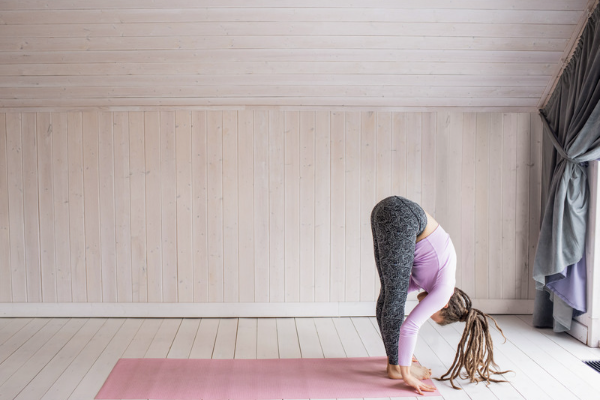One of the numerous advantages of practicing yoga is that it may help strengthen your immune system while gently restoring harmony to your body chakras. When you are unwell, lifting big weights is not something you should be doing, but if you practice easy stretches, you may be back to normal in no time without putting any strain on yourself.
Common cold and the practice of yoga

image source: Photo by Chevanon Photography: pexels
The virus is responsible for the majority of colds. Some signs of a cold include a wet or runny nose, a scratchy throat, a dull pain in the head, and a hacking cough. Because it is so easily spread, the common cold affects a large population. In this way, the immune system is crucial in fighting off colds. Yoga or hand mudra to cure cold and cough which emphasizes overall growth, might be useful for warding off colds and improving overall health. Managing cold is not only affected by physiological causes but also by psychological variables and stress.
The advantages of including yoga in one's daily regimen are many. In addition to boosting immunity, yoga helps the body recover more quickly after injury or illness. Yoga practice has been shown to lower stress hormone cortisol levels, decreasing the body's resistance to infection. Deep breathing exercises may assist the body take in more oxygen, reducing respiratory illnesses' symptoms, including the common cold, asthma, and allergies.
Most fundamental yoga poses for relieving a cold or which yoga is best for cold and cough?
Here we will discuss which yoga is best for cough. Asanas, or yoga mudra for cold and cough can provide the foundation for treating a cold:
Uttanasana
It's well recognized that the Uttanasana, also known as the Standing Forward Bend, is excellent for improving blood circulation. As a result, you'll be able to breathe easier and clear out any congestion in your sinuses. The neurological system is stimulated, and tension and stress are released.

Image source: mor shani: unsplash
Ustrasana
This asana, commonly known as the Camel Pose, helps cleanse the airways and expand the chest. It would help if you focused on getting as much air into your lungs as possible while holding this position. This will unblock all the passages that are blocking the cold.

image source: Photo by Anete Lusina:pexels
Setu Bandhasana
The Bridge Pose, or Setu Bandhasana, may be used in many different ways. It's a wonderful exercise for clearing the airways. In addition to helping the sinuses, this practice brings oxygenated blood to the brain. The thymus glands, a key immune system component, are also stimulated by this asana.

Image source: Image by yanalya: Freepik
Halasana
This is a great position for relieving sinus pressure and calming the adrenal glands. The result is enhanced blood flow and a more direct route for the body's natural cleansing processes. This position helps you recover from the cold by stimulating the parasympathetic nervous system, which then resets itself and begins healing the body more effectively.

Image source: Image by yanalya: Freepik
Salamba Sirsasana
This asana may seem among the most challenging in all of yoga. As the blood pooling in your feet rushes to your heart, it is filtered, and the toxins are carried away from your body. Increase your resistance to illness and fight off a cold with the aid of this asana. If you feel confused or need more support when attempting the position during a cold spell, you should try it against a wall.

Image source: Image by yanalya: Freepik
Pranayama, Yoga, and the Healing Power of Sound
Can you imagine playing or sleeping like a child? You may have a chance to view old pictures of you and your child when you were both in awkward poses. Please note how their fingers were placed as they slept and how they slept. There is no requirement to practice yoga or pranayama to benefit from them. You have it in you just as you see it in infants and young children; it's a part of your nature. Pranayama is a yoga mudra for cold and cough. For example, Vayu mudra raises internal body temperature, neutralizing acid production and easing a persistent cough.
The uplifting vibrations of Sanskrit chanting directly result from the language's tonal qualities. Our vitality increases when we're exposed to positive vibes. When you're under the weather, chanting may give you the energy you need to fight back.
If you listen to these chants with your eyes closed, you may enter a profound level of relaxation. That's how meditators feel. All healing begins with the mantras. Listening to chants as you relax on the floor is one option. Do not be alarmed if you find yourself nodding off; this is beneficial as it indicates that your higher energy level is redirected to healing.
Some recipes for coughing and the common cold
A few home recipes for cough and cold are as follows:
Soup

image source: Photo by Foodie Factor: pexels
Increase the number of tomatoes and spinach you use, along with the carrot, onion, cabbage, garlic, coriander, bottle gourd, capsicum, and salt. Prepare all these veggies by placing them in the cooker with water. After that, filter them out. To enhance the flavor, add some freshly squeezed lemon juice and roasted jeera, often known as caraway seeds. To get the desired consistency of the soup, purée the veggies cooked in a mixer and then drain the mixture.
Tonic made with herbs
Half a teaspoon of fresh ginger juice, half of a teaspoon of Tulsi juice, and a dash of ground black pepper, combine everything in a single teaspoon of honey. The mixture is ready. Repeat the dosage three to four times each day.
Okada
Take one cup of water, one inch of cinnamon, ten Tulsi leaves, one-half inch of ginger, two black peppercorns, and ten mint leaves and smash them together. Bring everything to a boil at the same time. After straining the liquid, add one teaspoon of honey. Consume liquids on a regular four-hour interval basis.












